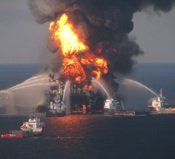If anyone had any doubts before, new government estimates confirmed yesterday that the oil gushing into the Gulf of Mexico surpasses the 11 million gallons dumped into Alaska's Prince William Sound in March 1989, when the Exxon Valdez tanker ran aground. The Sun Herald reports that new estimates from two teams of scientists say the leak in the Gulf is spewing between 504,000 and upwards of a million gallons a day, which means that between 18 million and 39 million gallons have spewed into the ocean to date.
In another development, scientists have discovered a "huge new plume" of what they believe is oil from the spill, that is roughly six miles wide by 22 miles long by 3,300 feet deep, just under the surface of the ocean heading northeast toward Mobile Bay. The plume is approaching an underwater canyon, according to The Sun Herald, "where it could poison the foodchain for sealife in the waters of Florida."
Larry McKinney, executive director of the Harte Research Institute for Gulf of Mexico Studies at Texas A&M University-Corpus Christi, said the DeSoto Canyon off the Florida Panhandle sends nutrient-rich water from the deep sea up to shallower waters.
McKinney said that in a best-case scenario, oil riding the current out of the canyon would rise close enough to the surface to be broken down by sunlight. But if the plume remains relatively intact, it could sweep down the west coast of Florida as a toxic soup as far as the Keys, through what he called some of the most productive parts of the Gulf.
BP is continuing its attempts to stop the leak by pumping heavy mud into the blowout. Company officials said yesterday that it would be "at least" 24 hours before they could say whether the procedure was successful. More than 100 miles of the Louisiana coastline has been affected by oil to date.



Comments
Use the comment form below to begin a discussion about this content.